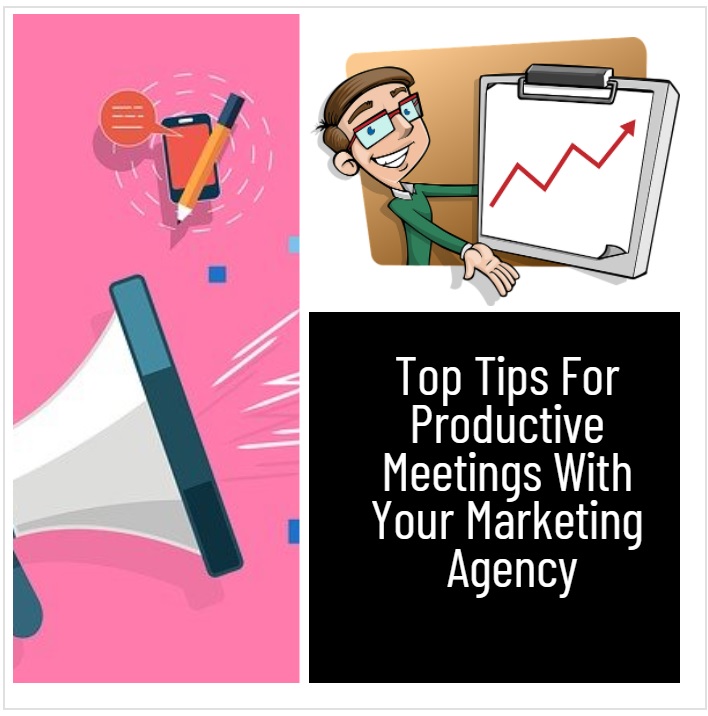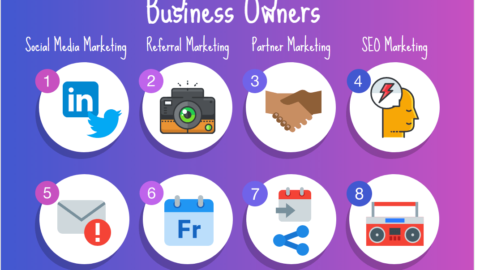Top Tips For Productive Meetings With Marketing Agencies
The goal of marketing is to convince people to buy your products and services and stay loyal to your brand. So, let’s talk about the importance of effective marketing. First of all, a business must have a marketing plan. The marketing plan involves a series of activities; therefore, you must conduct regular meetings with marketing agencies to ensure everything falls into place. Sometimes it feels like getting together with the other members of your digital marketing team can be more about socializing and catching up than actually getting work done. Asking your coworkers about their week isn’t a bad thing, but if you don’t stay on track and have marketing meeting agenda, your meetings will not be productive. You may realize that your meeting time is almost over and your team hasn’t gotten the chance to discuss anything related to work.
Table of Contents
Another problem with marketing meetings is that many people find that they get distracted or start to feel like they’re not contributing enough. (Which is another problem in and of itself.) How can you host efficient, productive meetings where everyone on the team has a chance to share their insights? Here’s how you can set a meeting with a purpose.
Meetings with Marketing Agencies Should Have a Purpose
Running the right marketing campaign isn’t easy, especially if you’re new to marketing. This is why it’s crucial to find a marketing agency, like fatcat studios, that you can work with consistently. An excellent way to do this is to have a clear meeting plan that you can share with your marketing agency. Marketing meetings are an essential part of the marketing process. However, marketing teams spend more time in meetings than any other department. If these meetings are not productive, they’ll be a considerable drain on the business. So, how do you go about making sure that your meetings aren’t only beneficial, but productive as well?
Did you know that executives consider 67% of meeting to be a failure? With this in mind, what can your agency do to make sure that each meeting has a clear end goal without running over your meeting time limit? The answer is in creating a marketing meeting agenda.
Quit Holding Unproductive Meetings with Marketing Agencies
There are 55 million meetings per week in the U.S. and your agency doesn’t need to have yet another unproductive meeting just for the sake of having one. If your agency is notorious for having unproductive meetings, it’s time to make a change. Unproductive meetings are both a waste of company time and money.
We’ve all heard the saying that “time is money.” And the fact of the matter is that this saying holds true even with agency meetings. If your employees are spending their valuable time sitting in on meetings that are fruitless, you’re wasting both their time and company money because they could be spending their time on tasks that are going to drive the bottom line.
Without a meeting agenda, your coworkers may find themselves easily distracted and disengaged from meaningful meeting conversation — which is never a good thing in an agency or any business for that matter.
Why Have a Marketing Meeting Agenda?
Meetings with marketing agencies are an important part of your business. They allow you to check in with your employees, marketing team members, look at any progress that has been made, figure out the next steps, and most importantly, discuss ideas and strategies for the upcoming campaign.
Meeting agendas are critical to ensure everyone knows what’s going to be discussed in the meeting, before the meeting. An agenda gives a list of the things that need to be talked about and accomplished in a given time period, so the marketing team isn’t wondering what is going to be said next.
So with that being said, how do you make your meeting agenda effective? Let’s talk about some of the things you need to go over in your marketing agency meeting.
5 Things to Discuss to Have a Productive Meeting with Marketing Agencies
Many marketers struggle with creating a meeting agenda. They either do not know how to structure one or they find it difficult to come up with relevant points. In other words: the meeting agenda is a stressful topic for many marketing professionals.
That’s why we are here — to make your life easier. Here are 5 points you need to add to your next marketing meeting agenda to ensure that everyone is excited and on the same page.
-
Let Them Share What They’ve Accomplished (15 min)
The best way to start a productive meeting is for everyone on your marketing team to share what they’ve accomplished. This allows you to see what’s been completed, and what is still being carried over into the next week (or sprint cycle). By looking at what has been completed, you can then assess if other marketing team members need to be pulled in to help out. You can ask yourself:
- Did the copywriter complete the blog before the deadline? Was it sent to the client for review?
- Has the Facebook Ad for XYZ company been launched? If not, what can the team do to help?
- Are there any notable wins you’ve noticed this week?
This is the time to celebrate and talk through all of their accomplishments — both big and small. This is also the time for the team to assess if there are any roadblocks on current projects and how they can fix those hindrances.
-
Talk Metrics and Growth (20 min)
Next, you need to allocate time in your meeting to go over the different marketing metrics and data points that showcase client growth and the areas to improve. Not sure what metrics to discuss? Here are some ideas to get you to start thinking about the metrics that matter the most to your agency.
Common Digital Marketing Metrics to Discuss
- Website Traffic – Your website traffic will let you know how many visitors have entered your site in a given timeframe (month, quarter, year, etc.)
- Conversion Rate – The conversion rate will let you know how successful your lead magnets or forms are performing on your site. Your conversion rate is one of the most important metrics because it gives you a glimpse into the health of the marketing initiatives that actually drive your client’s bottom line.
- Traffic Sources – Another metric to look at is the traffic source breakdown. Whether it be social media, direct search, organic search, paid media, or something else, you can look at how audiences are finding your clients and capitalize on that information.
- Bounce Rate – Your bounce rate will communicate to your team about how often a website user will enter onto your site just to automatically click out after viewing one page. By looking at bounce rate, your teams can figure out what marketing efforts have slid off the rails and strategize how they can put certain initiatives back on the growth path.
- Cost Per Lead – When talking to an external client, you want to be able to show them how much the cost per lead is with any marketing initiative that you launch. Just like how your agency wants to be profitable, so do your clients. If your cost per lead is more costly than the product or service, it may be time to find out how to lower the cost.
You don’t have to discuss these specific metrics in every meeting, but they are a good starting place to talk about if you haven’t talked through metrics collectively before. Bear in mind, if you are a digital marketer in a SaaS environment it can be tricky. You will have to look at the SaaS metrics, which are the same metrics but seen from another perspective.
Pro Tip: Let your marketing team members know way ahead of time about the different metrics you want them to present in the meeting. This will give them time to prepare a few slides so they aren’t scrambling to find the data during the meeting.
-
Discuss Upcoming Deliverables to Make Your Meeting More Productive (10 min)
You’ve discussed what’s been completed and the different growth metrics. Now, you can talk about the future.
This would be the time where managers would talk about upcoming client deliverables that have been discussed in client meetings or that are outlined in the individual client retainers. Here are a few deliverables your teams may want to briefly discuss during the meeting.
Common Marketing Deliverables to Discuss
- Blogs
- Website Copy
- Landing Pages
- Social Media
- Paid Advertising
Letting everyone know about what’s coming down the pipeline will keep all of your team members in the loop.
For example, if your copywriting team has a blog that will be finished next week, your design team will need to know when it will be ready and more information about the custom graphics that need to be made for the blog.
-
Ask Questions (5 min)
What’s a meeting without setting aside time to ask questions?
For about 5 minutes, you can give time for your team members to ask questions that pertain to your entire team as a whole. If one of your team members has a specific question for their manager, they can have a quick touch base after the meeting is over to go over the question they have.
-
Establish “Homework”(3 min)
Lastly, you will want to allow time for your managers to give “homework” to your team members. Your managers should be prepared to delegate tasks during this meeting and have an understanding of who is available and/or most qualified to take on certain tasks.
Again, if your team members have specific questions about a certain task, they can have quick sync up with their manager after the meeting is over.
What’s On Your Marketing Meeting Agenda?
We all know that meetings can be a bit of a chore, but we also know that they’re essential. A productive meeting is a happy meeting. The more effective your meetings are with your marketing agency, the better results the business will enjoy.
If you are tired of holding meetings with marketing agencies just for everyone to get sidetracked, it’s time to take action. Real change doesn’t happen overnight, but after a few agenda-driven meetings, holding productive meetings will become second nature to everyone on your team!
And, your team will know what they need to expect before the meeting occurs. This will allow your team members to prepare questions and talking points before the meeting time.
Vice President of Strategy and Marketing Services
From legacy Fortune 100 institutions to inventive start-ups, Ryan brings extensive experience with a wide range of B2B clients. He skillfully architects and manages the delivery of integrated marketing programs, and believes strongly in strategy, not just tactics, that effectively aligns sales and marketing teams within organizations.
Ryan is known for taking complex marketing and business challenges and developing solutions that simplify processes while driving customer outcomes and business value. He also thrives on guiding Elevation teams toward execution of strategies that help companies succeed in new verticals, while staying true to core values and brand integrity.










